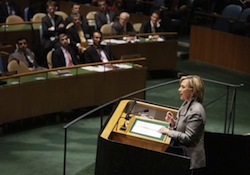US a Positive Force at 2010 NPT Review Conference
May 12, 2010
Featured Image
Today's top nuclear policy stories, with excerpts in bullet form.
Stories we're following today, Wednesday, May 12, 2010:
United States at the NPT: How Far Will the "Good Guy" Go? - Rebecca Johnson in Open Democracy [link]
- This is a very different Conference from five years ago, when the United States was viewed as a major spoiler after the Bush administration used procedural tactics to avoid being held to account for reneging on disarmament and other treaty commitments.
- This time, President Barack Obama’s initiatives have turned the United States into the ‘good guy’ – for the majority, if not all states parties to the NPT.
- President Mahmoud Ahmadinejad, who turned up to give Iran’s opening statement in person, failed to upstage Hillary Clinton, even though in UN protocol terms Head of State trumps mere Secretaries of State.
- Even more than in previous years, therefore, the United States is seen as a fixer. The high level US delegation is everywhere – deep in conversation with the Russians in one corner, while a cluster of diplomats meets in an adjacent room with Egypt to find an acceptable compromise on the Middle East.
- President Obama is undoubtedly sincere and genuine in his desire for a nuclear-weapon-free world, but he has much to do to overcome powerful vested interests in the United States and the other nuclear-armed countries.
Iran's Missile to Watch - David Hoffman in Foreign Policy [link]
- If Iran is on a quest to become a nuclear-armed power, its missiles will reflect its intentions. An important new study just released by the International Institute of Strategic Studies in London contains a wealth of detail from open sources about Iran's missile program, and how Iran might match those missiles to a nuclear warhead.
- The study concludes that Iran is probably aiming first to perfect a solid-fuel, medium-range missile that can carry a nuke to hit regional targets, such as Israel, rather than attempting to launch a continent-spanning weapon aimed at the United States.
- The new study points out that Iran's acquisition of the fissile material for building a nuke -- getting the uranium and plutonium -- is not the only factor worth watching. Iran's missile development ambitions also provide tell-tale clues.
The Myth of Missile Defense As a Deterrent - Bulletin of the Atomic Scientists [link]
- [Obama's Nuclear Posture Review] signals a fresh approach to nuclear doctrine; however, its reliance on missile defense as an element of nuclear deterrence is wrong. Such systems are useless, dangerous, and destabilizing, and ramping up reliance on missile defenses because of planned reductions to the U.S. operational nuclear stockpile is deeply misguided.
- The NPR essentially asserts that missile defense can somehow compensate for the deterrent capability that will supposedly be lost due to reductions in the U.S. nuclear stockpile.
- If Tehran does obtain nuclear weapons, surrounding it with missile defenses, no matter how effective, will never eliminate the threat that a single missile could penetrate the defense system.
- Exaggerating the abilities of missile defense is downright dangerous and military leaders ought to make sure that it doesn't happen; unfortunately, it does.
- And if [policymakers] incorrectly think that missile defense has secured the country by neutralizing the threat of ballistic missile attack, policy makers might be emboldened to stake out riskier and more aggressive regional policies than in the absence of missile defense.
White House Sends Russia Civilian Nuclear Deal to Congress - Foreign Policy's The Cable [link]
- Up against a self-imposed deadline, the White House resubmitted the U.S.-Russia civilian nuclear agreement to Congress Tuesday and made their case for Congress to allow the deal to go through.
- The administration sees the deal as a carrot which can be used to entice Russia to sign on to tough sanctions against Iran at the U.N. But for Iran critics on Capitol Hill, they see the White House's action this week as putting the cart before the horse and are skeptical that the agreement can be implemented under current conditions.
- The Bush administration had submitted the agreement back in 2008, but withdrew it after to Russia-Georgia war. But President Obama said today he no longer thought that should be an issue.
- Congress has 90 days to pass a law blocking the deal, or it goes into effect, and they must be days when Congress is in continuous session. Since Congress is expected to recess around August 12, this week was the last chance the administration to submit it without that deadline slipping into next year.
A View from the Dark Side
Obama's Naive Nuke Policy Causes Concern - The Tennessean [link]
- Even in the context of liberalism, President Obama's recent policy declarations on the matter of nuclear weapons are juvenile and disturbing.
- Imagine that all of the existing nuclear powers agreed that their weapons were more of a threat to "peace and security" than they were worth, and voluntarily destroyed them all. Would the world immediately become a safer place? No. It would become far more dangerous.
- So as Iran closes in on a nuclear weapon — a result the administration has repeatedly declared to be "unacceptable" — the administration is getting serious by ... setting a good example.
- In a child, naivete about world peace is understandable. In a leader, it is frightening.



